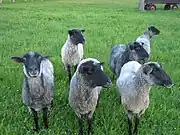양
| ||||||||||
| 야약앾앿얀얁얂 얃얄얅얆얇얈얉 얊얋얌얍얎얏얐 양얒얓얔얕얖얗 | |
| 애 ← | → 얘 |
|---|---|
Jeju
Pronunciation
| Romanizations | |
|---|---|
| Revised Romanization? | yang |
| Revised Romanization (translit.)? | yang |
| Yale Romanization? | yang |
Korean
Etymology 1
Sino-Korean word from 量 (“quantity”)
Pronunciation
- (SK Standard/Seoul) IPA(key): [ja̠ŋ]
- Phonetic hangul: [양]
| Romanizations | |
|---|---|
| Revised Romanization? | yang |
| Revised Romanization (translit.)? | yang |
| McCune–Reischauer? | yang |
| Yale Romanization? | yang |
- South Gyeongsang (Busan) pitch accent: 양의 / 양에 / 양까지
Syllables in red take high pitch. This word always takes low pitch, and heightens the pitch of two subsequent suffixed syllables.
Noun
| South Korean Standard Language |
양(量) (yang) |
|---|---|
| North Korean Standard Language |
량(量) (ryang) |
양 • (yang) (hanja 量)
Derived terms
- See the hanja entry at 量 for Sino-Korean compounds of 양 (量, yang).
Etymology 2
Sino-Korean word from 羊 (“sheep, goat”)
Pronunciation
- (SK Standard/Seoul) IPA(key): [ja̠ŋ]
- Phonetic hangul: [양]
| Romanizations | |
|---|---|
| Revised Romanization? | yang |
| Revised Romanization (translit.)? | yang |
| McCune–Reischauer? | yang |
| Yale Romanization? | yang |
- South Gyeongsang (Busan) pitch accent: 양의 / 양에 / 양까지
Syllables in red take high pitch. This word takes low pitch only before consonant-initial multisyllabic suffixes.
Derived terms
- See the hanja entry at 羊 for Sino-Korean compounds of 양 (羊, yang).
Etymology 3
Sino-Korean word from 陽 (“yang”).
Pronunciation
- (SK Standard/Seoul) IPA(key): [ja̠ŋ]
- Phonetic hangul: [양]
| Romanizations | |
|---|---|
| Revised Romanization? | yang |
| Revised Romanization (translit.)? | yang |
| McCune–Reischauer? | yang |
| Yale Romanization? | yang |
Noun
양 • (yang) (hanja 陽)
- (philosophy) yang (the essential male principle in East Asian religion or philosophy)
- Coordinate term: 음(陰) (eum)
Derived terms
- See the hanja entry at 陽 for Sino-Korean compounds of 양 (陽, yang).
Etymology 4
Sino-Korean word from 孃 (“woman, girl”)
Pronunciation
- (SK Standard/Seoul) IPA(key): [ja̠ŋ]
- Phonetic hangul: [양]
| Romanizations | |
|---|---|
| Revised Romanization? | yang |
| Revised Romanization (translit.)? | yang |
| McCune–Reischauer? | yang |
| Yale Romanization? | yang |
Noun
양 • (yang) (hanja 孃)
Derived terms
- See the hanja entry at 孃 for Sino-Korean compounds of 양 (孃, yang).
Etymology 5
Sino-Korean word from 兩 (“two”).
Pronunciation
- (SK Standard/Seoul) IPA(key): [ja̠(ː)ŋ]
- Phonetic hangul: [양(ː)]
- Though still prescribed in Standard Korean, most speakers in both Koreas no longer distinguish vowel length.
| Romanizations | |
|---|---|
| Revised Romanization? | yang |
| Revised Romanization (translit.)? | yang |
| McCune–Reischauer? | yang |
| Yale Romanization? | yāng |
Determiner
| South Korean Standard Language |
양(兩) (yang) |
|---|---|
| North Korean Standard Language |
량(兩) (ryang) |
양 • (yang) (hanja 兩)
Derived terms
- See the hanja entry at 兩 for Sino-Korean compounds of 양 (兩, yang).
Etymology 6
Sino-Korean word from 洋 (“ocean; Western (because Westerners came by sea)”).
Pronunciation
- (SK Standard/Seoul) IPA(key): [ja̠ŋ]
- Phonetic hangul: [양]
| Romanizations | |
|---|---|
| Revised Romanization? | yang |
| Revised Romanization (translit.)? | yang |
| McCune–Reischauer? | yang |
| Yale Romanization? | yang |
Prefix
양— • (yang-) (hanja 洋)
Derived terms
- See the hanja entry at 洋 for Sino-Korean compounds of 양 (洋, yang).
Etymology 7
Sino-Korean word from 良 (“good”).
Pronunciation
- (SK Standard/Seoul) IPA(key): [ja̠ŋ]
- Phonetic hangul: [양]
| Romanizations | |
|---|---|
| Revised Romanization? | yang |
| Revised Romanization (translit.)? | yang |
| McCune–Reischauer? | yang |
| Yale Romanization? | yang |
Noun
| South Korean Standard Language |
양(良) (yang) |
|---|---|
| North Korean Standard Language |
량(良) (ryang) |
양 • (yang) (hanja 良)
Derived terms
- See the hanja entry at 良 for Sino-Korean compounds of 양 (良, yang).
Etymology 8
Sino-Korean word from 壤 (“yang”)
Numeral
양 • (yang) (hanja 壤)
- (uncommon) 1028
- (The addition of quotations indicative of this usage is being sought:)
Derived terms
- See the hanja entry at 壤 for Sino-Korean compounds of 양 (壤, yang).
Etymology 9
Modern Korean reading of various Chinese characters.
Syllable
양 (yang)
| Extended content |
|---|
Etymology 10
Modern Korean reading of various Chinese characters in isolation or as the first element of a compound. As the non-initial element of a compound, they are read as 량 (ryang).
In North Korea, after a language reform in the mid-twentieth century intended to make Sino-Korean readings uniform, they are always read as 량 (ryang)in all environments.
Syllable
양 (yang)
| Extended content |
|---|
|
References
- Supreme Court of the Republic of Korea (대한민국 대법원, Daehanmin'guk Daebeobwon) (2018). Table of hanja for personal names (인명용 한자표 / 人名用漢字表, Inmyeong-yong hanja-pyo).

.jpg.webp)